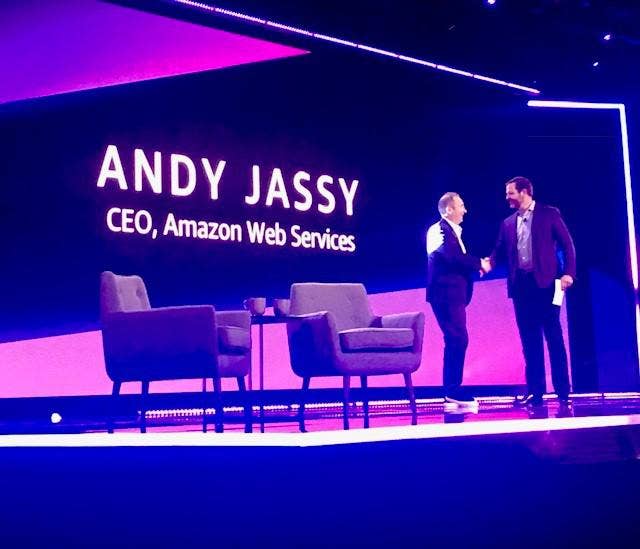AWS CEO Andy Jassy To Partners: 'There Are So Many Customers That Need Your Help'

Amazon Web Services CEO Andy Jassy Tuesday at the AWS re:Invent Partner Summit rallied solution providers to avoid the "noise and distraction" when it comes to the cloud and go deep with cloud knowledge and expertise to keep customers happy long term.
"There are so many customers that need your help," Jassy told partners at the conference, being held in Las Vegas this week. "The consulting partners that make the time and investment to educate and train are the ones that are making progress."
But don't "hedge," he warned. It's not enough to simply sell cloud anymore, he said, talking up the importance for partners to have the right training and deep expertise within their own shops so they can better advise customers and handle the demand around cloud.
"Make sure you're not playing 'not to lose.' Make sure you're really focusing on what customers need, and how can I be really skilled to help them accomplish their goals," Jassy said.
[Related: 5 Things To Watch At AWS re:Invent 2018]
"There's this sense of urgency that partners need to move past cloud compute and into cloud transformation, and they need to do it smartly and in a way that is much more strategic for customers," said Gene Villeneuve, senior vice president of Tehama.io, a business unit of Pythian, an Advanced Consulting Partner with AWS.
Pythian, which also partners with Google and Microsoft, went all in on cloud several years ago, but the solution provider was always focused on strategic services, including machine learning and big data analytics. The company today is the proud owner of both a Migration and DevOps AWS competency, which helps Pythian stand out as a partner with deep expertise, Villeneuve said.
Villeneuve runs Tehama.io for Pythian, which is a platform for secure remote access, auditing and compliance. Jassy said that customers are looking for enhanced security on AWS, and Villeneuve said that Tehama.io is a great example of a solution helping customers secure their end-user work spaces on AWS.
"It's not about lifting and shifting something into the cloud. Cloud should be embedded into the fabric of the organization, and I don't think many customers have figured that out yet," Villeneuve said. "It's good to see AWS recognizing that as well."
Brendan Caulfield, co-founder of AWS Advanced Consulting Partner Turing Group, said that the conversation with customers isn't really about "cloud" anymore, even though the cloud is only in its infancy.
"The transition everyone is going through is about a completely new way to build, deploy and manage applications—one that has little to no relationship to what is done today. This evolution moves applications and data closer to customers, which improves engagement and overall customer satisfaction. At the end of the day, if the investments being made aren’t bringing a business closer to its customers, they aren’t worth making," Caulfield said.
AWS' revenue grew by 46 percent year over year, the company reported during its last fiscal quarter, but what's been more exciting to watch is the growth of its partner business, Terry Wise, global vice president of channels and alliances, said during the Partner Summit.
AWS' channel program initially was filled with "born-in-the-cloud" solution providers, but no, global systems integrators and every kind of solution provider in between are getting in the game, Wise and Jassy both said.
Some enterprises are turning to the trusted partner they've had a long-term relationship with to get to the cloud, but others are viewing the move to the cloud as a breaking point in which to make brand-new decisions, including making the switch to a new kind of partner.
"It's incredibly important for either your existing customers making that move, or if you're trying to do business with new customers, to go deep," Jassy said. "People are picking their next partners that they are going to work with for the next 20 years."
Specifically, Jassy said that the U.S. is at a very early stage in public sector adoption in the cloud space, so the opportunity to help these organizations with mass migrations is huge.
"There are a lot of mainstream enterprises just now starting to plan their approach to the cloud in a meaningful way, and they want help doing an analysis," he said. These businesses need help figuring out which workloads can move to the cloud first, which ones should move last, and if any workloads need to be rearchitected before a move.
Jassy also couldn’t resist taking a jab at Oracle, AWS' well-established rival, and told partners that businesses were "sick" of the older-guard database providers that are less flexible and more expensive.
"I do not encounter enterprises not looking to flee Oracle. With the maturity and growth of Aurora [Amazon's hosted relational database service], people are looking to move as fast as they can, but they need help. I think when you really think about what your clients want over the long term and a net-new opportunity that's good for them and good for you, I think database migration is key."